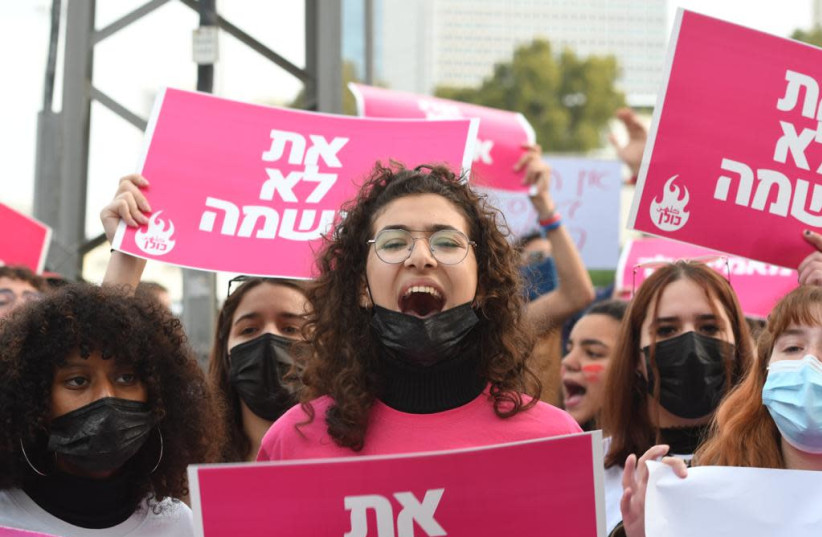We are all familiar with the new face of antisemitism. It’s not politically correct anymore to outwardly identify as an antisemite (in most circles), so disguises, such as disproportionate criticism of Israel, are used instead.
Recently, certain groups in Israel have employed this same strategy in the context of violence against women and domestic violence. It’s hard to believe, but in the year 2022 there is a campaign against gender equality and reducing gender-based violence. So why isn’t everyone up in arms? Because it’s disguised as a rational campaign against the Istanbul Convention. This campaign is wrought with lies and misrepresentations. It is important to understand this fake-news and why signing the Convention is a critical next step for Israel.
The Istanbul Convention, or, by its full name, the Council of Europe Convention on Preventing and Combating Violence Against Women and Domestic Violence, is the gold standard for fighting violence against women. Entered into force in May 2014 in Istanbul, the Convention is a road map for states to follow for an all-around solution to this problem that plagues societies around the world, regardless of race, religion or economic status.
The Convention consists of four pillars: prevention, prosecution, protection and coordinated policies. To date, forty-five countries have signed the Convention. Should Israel sign, it will be the first non-European country to do so.
Signing the Convention will bring Israel a major step closer to eradicating gender violence and will protect thousands of women and children. This is extremely relevant in light of the dramatic rise in the rate of domestic violence in Israel, mainly since the outbreak of COVID-19.

Despite many committees on the issue, Israel’s existing strategy to curb gender-based violence continues to fail, as was sharply demonstrated just last year in the State Comptroller’s Report. A major factor hindering the system is a critical lack of coordination between the various state bodies involved (law enforcement, the legal system, welfare, legislation, and so on). The Convention provides a road map for correcting this.
In November 2021, in what was hailed as a victory for women in Israel, Justice Minister Gideon Sa’ar and Foreign Minister Yair Lapid publicly committed to promoting the Convention for signature by Israel. In January 2022, the Foreign Ministry sent an official request to the Council of Europe to sign. The Council’s formal invitation to Israel now awaits a final confirmation vote by the government.
With victory in sight, opponents to the convention have started a major campaign to derail the process. These opponents include Minister of the Interior Ayelet Shaked who, as minister of justice until 2019, was committed to signing the Istanbul Convention.
The campaign’s claims are inaccurate. All of them were examined by the Ministry of Justice during its due diligence on the Convention before it was brought to the government. All of the claims were refuted, as was pointed out by the Committee for Gender Equality in a recent discussion on the matter in the Knesset.
THE OPPOSITION rests on three main arguments. First, there are three sections in the Convention that pertain to granting asylum status to women fleeing gender-based violence. This, say the opponents, could potentially flood Israel with non-Jews from other countries, risking the Jewish majority. This is a baseless scare tactic.
Israel can, and will, reject the three articles pertaining to asylum status for women fleeing gender-based violence through entering a reservation (Sec. 59), thereby indicating Israel is not bound by the section, and by adding an interpretive declaration (Secs. 60-61) it guarantees that nothing in Israel’s policy on migration will change as a result of joining the Convention.
Second, opponents fear that the Convention’s definition of gender poses a potential threat to traditional education and family values. This is a gross exaggeration. The status-quo regarding gender education will remain in place. Israel is party to many other conventions, including those with external monitoring bodies that publish recommendations to bring Israel more in line with international standards, including on issues of gender equality. Israel has always maintained the final say over which recommendations to implement and it has not been punished for failing to take greater action on these issues.
Finally, opponents argue that Israel should refrain from signing because certain Western countries, including the United States, Canada and England, have not signed the Convention. This is misleading. The US and Canada have not signed the Convention because their internal federal systems make passing international conventions more complex.
In fact, the US has not even ratified the Convention on the Rights of the Child, or the Convention on the Elimination of All Forms of Discrimination Against Women. England holds the Convention in such high esteem that it has initiated a lengthy process of reforming its domestic laws in order to fully comply with the Convention, and is reporting to its Parliament on a yearly basis on the progress of that process.
Signing the Convention poses absolutely no danger to Israel.
Failing to complete the process, at this stage, will be a major international embarrassment and a missed historical opportunity to protect thousands of Israeli women and children for years to come.
With the opposition’s arguments fully refuted, we are left with one conclusion. Their real opposition is with the essence of the Istanbul Convention: greater gender equality and hard work to end gender-based violence. Not one of the groups leading the opposition suggested alternative plans for ending the violence. Their real motives are clear. Don’t be fooled.
Prof. Ruth Halperin-Kaddari is the founding academic director of Bar-Ilan University’s Rackman Center for the Advancement of the Status of Women, which has played an instrumental role in advocating for Israeli government support for the Istanbul Convention. She is a former vice president of the UN Committee for the Elimination of Discrimination Against Women.
Leah Goeppinger-Levy is a staff member at Bar-Ilan University’s Rackman Center for the Advancement of the Status of Women and holds a Master’s Degree in Gender Studies from Bar-Ilan University.
